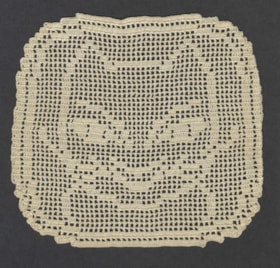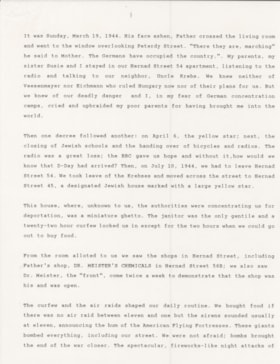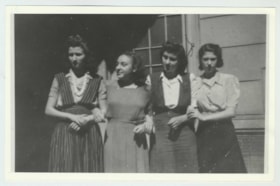Narrow Results By
Doily
https://www.cjhn.ca/link/cjhn60379
- Collection
- Montreal Holocaust Museum
- Description Level
- Item
- Material Type
- object
- Physical Description
- Doily : crocheted ; Ht: 5 in. x W: 5,5 in.
- Date
- 1944
- Collection
- Montreal Holocaust Museum
- Description Level
- Item
- Material Type
- object
- Physical Description
- Doily : crocheted ; Ht: 5 in. x W: 5,5 in.
- Other Title Information
- Household Accessory
- Date
- 1944
- Physical Condition
- Excellent
- Notes
- Crocheted lace doily with pattern of a cat's face Narrative: Donor Marianne Guttmann-Bolgar crocheted this doily while she was a child in hiding during the war, in November 1944. She was 14 years old and was hiding in the basement of a shop.
- Accession No.
- 2011X.80.02-03
- Name Access
- Bolgar, Marianne
- Places
- Budapest, Hungary, Europe
- Archival / Genealogical
- Archival Descriptions
- Repository
- Montreal Holocaust Museum
Images
Manuscript
https://www.cjhn.ca/link/cjhn59633
- Collection
- Montreal Holocaust Museum
- Description Level
- Item
- Material Type
- textual record
- Physical Description
- Manuscript : Paper : Printed : ink : Black, White ; Ht: 27,5 cm x W: 19 cm
- Date
- 1994
- Collection
- Montreal Holocaust Museum
- Description Level
- Item
- Material Type
- textual record
- Physical Description
- Manuscript : Paper : Printed : ink : Black, White ; Ht: 27,5 cm x W: 19 cm
- Other Title Information
- Documentary Artifact
- Date
- 1994
- Creator
- Bolgar, Marianne
- Physical Condition
- Good
- Language
- English
- Notes
- Manuscript, nine pages in length, account of events by Marianne Bolgar. The manuscript starts with the arrival of the German army in Budapest on 14 March 1944. Narrative: Marianne Bolgar was born on 27 November 1929. In her account of the war, Marianne Bolgar remembers when the Germans arrived in Budapest on 1944-3-19. She lived with her family on Peterdy street and, later that year; they were forced to move across the street into single building with the other Jewish families. It was marked by a yellow star, a 'mini-ghetto, and they were allowed to leave for only two hours a day to buy food. The teenagers of the house would often sneak to the roof during air raids. August 15 1944 saw the destruction of the ghetto in an air raid. The nearest shelter was the Krebs' basement; at the end of the raid "Uncle' Krebs warned Marianne's father not to leave with the rest of the Jews. They remained in Uncle Krebs' store basement at 56b Hernad Street. Through hiding they were able to escape the government’s calls for Jewish men and women, between 16 and 50. In November, Uncle Krebs and Dr. Meister warned them to get out, as death was now the punishment for harboring Jews. They refused to leave and were allowed to remain. The hope was that the Russians would arrive and liberate them soon. Later that year the Allied bombing destroyed electricity and water in the city, and her family was forced to use a can of oil and string for light and jars of water they had collected from a dripping tap. In December they heard from the conversations upstairs that their hiding place had been hit by a bomb which did not explode. 23 December 1944 saw the Russians advancing towards Budapest, and the increased presence of Germans and Panzer Platoons in the city. Her father, who was a loud snorer, had to sleep during the day when moving tanks would mask the sound. A few days later they were freed by a Russian soldier. Marianne remarks that their old neighbors, who had neither harmed nor helped them, seemed to wish them to hell for returning. She decided to leave Hungary as soon as she could.
- Accession No.
- 1994.2.1
- Name Access
- Bolgar, Marianne
- Archival / Genealogical
- Archival Descriptions
- Repository
- Montreal Holocaust Museum
Images
Marianne Bolgar and her friends
https://www.cjhn.ca/link/cjhn90279
- Collection
- Montreal Holocaust Museum
- Description Level
- Item
- Material Type
- graphic material
- Physical Description
- Photograph : Paper : Printed : photograph : b&w ; Ht: 11.5 cm x W: 18 cm
- Date
- July 1944
- Collection
- Montreal Holocaust Museum
- Description Level
- Item
- Material Type
- graphic material
- Physical Description
- Photograph : Paper : Printed : photograph : b&w ; Ht: 11.5 cm x W: 18 cm
- Other Title Information
- Documentary Artifact
- Date
- July 1944
- Physical Condition
- Excellent
- Notes
- White border. Outdoor group portrait of four young women stand arm-in-arm in front of a building. The building is in shadow on the left side. Photo taken in Budapest in July, 1944. The donor, Marianne Bolgar, is standing second from left. None of the women wear stars. Narrative: Marianne Bolgar was born on 27 November 1929. In her account of the war, Marianne Bolgar remembers when the Germans arrived in Budapest on 1944-3-19. She lived with her family on Peterdy street and, later that year; they were forced to move across the street into single building with the other Jewish families. It was marked by a yellow star, a 'mini-ghetto, and they were allowed to leave for only two hours a day to buy food. The teenagers of the house would often sneak to the roof during air raids. August 15 1944 saw the destruction of the ghetto in an air raid. The nearest shelter was the Krebs' basement; at the end of the raid "Uncle' Krebs warned Marianne's father not to leave with the rest of the Jews. They remained in Uncle Krebs' store basement at 56b Hernad Street. Through hiding they were able to escape the government’s calls for Jewish men and women, between 16 and 50. In November, Uncle Krebs and Dr. Meister warned them to get out, as death was now the punishment for harboring Jews. They refused to leave and were allowed to remain. The hope was that the Russians would arrive and liberate them soon. Later that year the Allied bombing destroyed electricity and water in the city, and her family was forced to use a can of oil and string for light and jars of water they had collected from a dripping tap. In December they heard from the conversations upstairs that their hiding place had been hit by a bomb which did not explode. 23 December 1944 saw the Russians advancing towards Budapest, and the increased presence of Germans and Panzer Platoons in the city. Her father, who was a loud snorer, had to sleep during the day when moving tanks would mask the sound. A few days later they were freed by a Russian soldier. Marianne remarks that their old neighbors, who had neither harmed nor helped them, seemed to wish them to hell for returning. She decided to leave Hungary as soon as she could.
- Accession No.
- 1990.97.05
- Name Access
- Bolgar, Marianne
- Places
- Budapest, Hungary, Europe
- Archival / Genealogical
- Archival Descriptions
- Repository
- Montreal Holocaust Museum
Images
Marianne Bolgar née Guttmann with doll
https://www.cjhn.ca/link/cjhn90283
- Collection
- Montreal Holocaust Museum
- Description Level
- Item
- Material Type
- graphic material
- Physical Description
- Photograph : Paper : Printed : photograph : b&w ; Ht: 17.9 cm x W: 12.6 cm
- Date
- 1931
- Collection
- Montreal Holocaust Museum
- Description Level
- Item
- Material Type
- graphic material
- Physical Description
- Photograph : Paper : Printed : photograph : b&w ; Ht: 17.9 cm x W: 12.6 cm
- Other Title Information
- Documentary Artifact
- Date
- 1931
- Physical Condition
- Excellent
- Notes
- Large white border. A young girl stands in front of a fence with a building in the background. She wears a coat with a cap and holds a doll in one hand and flowers in the other. She is smiling. Narrative: Marianne Bolgar was born on 27 November 1929. She remembers when the Germans arrived in Budapest on 1944-3-19. She lived with her family on Peterdy street and, later that year; they were forced to move across the street into single building with the other Jewish families. It was marked by a yellow star, a 'mini-ghetto, and they were allowed to leave for only two hours a day to buy food. The teenagers of the house would often sneak to the roof during air raids. August 15 1944 saw the destruction of the ghetto in an air raid. The nearest shelter was the Krebs' basement; at the end of the raid "Uncle' Krebs warned Marianne's father not to leave with the rest of the Jews. They remained in Uncle Krebs' store basement at 56b Hernad Street. Through hiding they were able to escape the government’s calls for Jewish men and women, between 16 and 50. In November, Uncle Krebs and Dr. Meister warned them to get out, as death was now the punishment for harboring Jews. They refused to leave and were allowed to remain. The hope was that the Russians would arrive and liberate them soon. Later that year the Allied bombing destroyed electricity and water in the city, and her family was forced to use a can of oil and string for light and jars of water they had collected from a dripping tap. In December they heard from the conversations upstairs that their hiding place had been hit by a bomb which did not explode. 23 December 1944 saw the Russians advancing towards Budapest, and the increased presence of Germans and Panzer Platoons in the city. Her father, who was a loud snorer, had to sleep during the day when moving tanks would mask the sound. A few days later they were freed by a Russian soldier. Marianne remarks that their old neighbors, who had neither harmed nor helped them, seemed to wish them to hell for returning. She decided to leave Hungary as soon as she could.
- Accession No.
- 1990.97.02
- Name Access
- Bolgar, Marianne
- Places
- Bratislava, Slovakia, Europe
- Archival / Genealogical
- Archival Descriptions
- Repository
- Montreal Holocaust Museum
Images
Report card
https://www.cjhn.ca/link/cjhn50155
- Collection
- Montreal Holocaust Museum
- Description Level
- Item
- Material Type
- textual record
- Physical Description
- Report card : paper : Black, White, Blue ; Ht: 8,5 in. x W: 4,75 in.
- Date
- September 8, 1941-January 06, 1946
- Collection
- Montreal Holocaust Museum
- Description Level
- Item
- Material Type
- textual record
- Physical Description
- Report card : paper : Black, White, Blue ; Ht: 8,5 in. x W: 4,75 in.
- Other Title Information
- Documentary Artifact
- Date
- September 8, 1941-January 06, 1946
- Physical Condition
- Excellent
- Language
- Hungarian
- Notes
- In the centre of the cover is the Hungarian crest. In the interior of the book are 9 circular stamps, and 7 square postage stamps with the Hungarian crest on them. Narrative: This report card from the Budapest Jewish Gymnasium, belonged to the Marianne Bolgar (donor). It contains two reports, the first from the German school she originally attended, the second is from the Jewish school to which she was forced to transfer to.
- Accession No.
- 2011X.80.01
- Name Access
- Bolgar, Marianne
- Places
- Budapest, Hungary, Europe
- Archival / Genealogical
- Archival Descriptions
- Repository
- Montreal Holocaust Museum
Images
The Story of Hungary 1944; and The Trouble with Drawing Parallels Between the Exodus and the Holocaust
https://www.cjhn.ca/link/cjhn59634
- Collection
- Montreal Holocaust Museum
- Description Level
- Item
- Material Type
- textual record
- Physical Description
- Manuscript : paper : Typewritten : ink : Black, white ; Ht: 27,5 cm x W: 19 cm
- Date
- April 02, 1994
- Collection
- Montreal Holocaust Museum
- Description Level
- Item
- Material Type
- textual record
- Physical Description
- Manuscript : paper : Typewritten : ink : Black, white ; Ht: 27,5 cm x W: 19 cm
- Other Title Information
- Documentary Artifact
- Date
- April 02, 1994
- Creator
- Bolgar, Marianne
- Physical Condition
- Good
- Language
- English
- Notes
- Manuscript of a speech given on 2 April 1994 by Marianne Bolgar. Discussion of appropriate ways for the Jewish community to reflect on the Holocaust, the trouble with drawing parallels between the Exodus and Holocaust, and opinion about proposed national dates for memorial.
- Accession No.
- 1994.2.2
- Name Access
- Bolgar, Marianne
- Archival / Genealogical
- Archival Descriptions
- Repository
- Montreal Holocaust Museum
Images
{{ server.message }}










